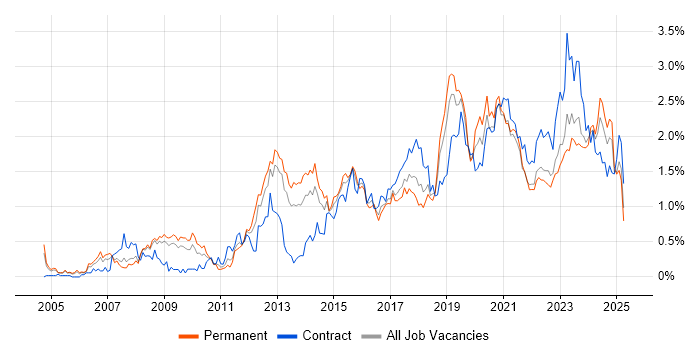Infrastructure Engineer
South West > Bristol
The median Infrastructure Engineer salary in Bristol is £71,991 per year, according to job vacancies posted during the 6 months leading to 5 May 2025.
The table below provides salary benchmarking and summary statistics, comparing them to the same period in the previous two years.
| 6 months to 5 May 2025 |
Same period 2024 | Same period 2023 | |
|---|---|---|---|
| Rank | 82 | 109 | 139 |
| Rank change year-on-year | +27 | +30 | +8 |
| Permanent jobs requiring an Infrastructure Engineer | 21 | 48 | 33 |
| As % of all permanent jobs advertised in Bristol | 1.67% | 1.55% | 1.24% |
| As % of the Job Titles category | 1.76% | 1.60% | 1.34% |
| Number of salaries quoted | 19 | 33 | 27 |
| 10th Percentile | £44,250 | £36,250 | £45,750 |
| 25th Percentile | £60,000 | £43,750 | £51,250 |
| Median annual salary (50th Percentile) | £71,991 | £47,500 | £60,000 |
| Median % change year-on-year | +51.56% | -20.83% | +38.73% |
| 75th Percentile | £78,750 | £51,250 | £67,500 |
| 90th Percentile | £88,000 | £62,900 | £87,419 |
| South West median annual salary | £60,822 | £50,000 | £47,250 |
| % change year-on-year | +21.64% | +5.82% | +5.00% |
All Permanent IT Job Vacancies
Bristol
For comparison with the information above, the following table provides summary statistics for all permanent IT job vacancies in Bristol. Most job vacancies include a discernible job title that can be normalized. As such, the figures in the second row provide an indication of the number of permanent jobs in our overall sample.
| Permanent vacancies in Bristol with a recognized job title | 1,194 | 3,006 | 2,460 |
| % of permanent jobs with a recognized job title | 94.99% | 97.03% | 92.73% |
| Number of salaries quoted | 809 | 2,247 | 1,544 |
| 10th Percentile | £34,500 | £33,500 | £31,250 |
| 25th Percentile | £47,231 | £42,500 | £42,500 |
| Median annual salary (50th Percentile) | £57,500 | £57,500 | £57,810 |
| Median % change year-on-year | - | -0.54% | +8.85% |
| 75th Percentile | £71,250 | £71,250 | £73,776 |
| 90th Percentile | £87,500 | £85,000 | £87,500 |
| South West median annual salary | £52,600 | £50,000 | £52,500 |
| % change year-on-year | +5.20% | -4.76% | +5.00% |
Infrastructure Engineer
Job Vacancy Trend in Bristol
Job postings that featured Infrastructure Engineer in the job title as a proportion of all IT jobs advertised in Bristol.

Infrastructure Engineer
Salary Trend in Bristol
3-month moving average salary quoted in jobs citing Infrastructure Engineer in Bristol.
Infrastructure Engineer
Salary Histogram in Bristol
Salary distribution for jobs citing Infrastructure Engineer in Bristol over the 6 months to 5 May 2025.
Infrastructure Engineer Skill Set
Top 30 Co-occurring Skills and Capabilities in Bristol
For the 6 months to 5 May 2025, Infrastructure Engineer job roles required the following skills and capabilities in order of popularity. The figures indicate the absolute number co-occurrences and as a proportion of all permanent job ads across the Bristol region featuring Infrastructure Engineer in the job title.
|
|
Infrastructure Engineer Skill Set
Co-occurring Skills and Capabilities in Bristol by Category
The follow tables expand on the table above by listing co-occurrences grouped by category. The same employment type, locality and period is covered with up to 20 co-occurrences shown in each of the following categories:
|
|
|||||||||||||||||||||||||||||||||||||||||||||||||||||||||||||||||||||||||||||||||||||||||||||||||||
|
|
|||||||||||||||||||||||||||||||||||||||||||||||||||||||||||||||||||||||||||||||||||||||||||||||||||
|
|
|||||||||||||||||||||||||||||||||||||||||||||||||||||||||||||||||||||||||||||||||||||||||||||||||||
|
|
|||||||||||||||||||||||||||||||||||||||||||||||||||||||||||||||||||||||||||||||||||||||||||||||||||
|
|
|||||||||||||||||||||||||||||||||||||||||||||||||||||||||||||||||||||||||||||||||||||||||||||||||||
|
|
|||||||||||||||||||||||||||||||||||||||||||||||||||||||||||||||||||||||||||||||||||||||||||||||||||
|
|
|||||||||||||||||||||||||||||||||||||||||||||||||||||||||||||||||||||||||||||||||||||||||||||||||||
|
|
|||||||||||||||||||||||||||||||||||||||||||||||||||||||||||||||||||||||||||||||||||||||||||||||||||
|
||||||||||||||||||||||||||||||||||||||||||||||||||||||||||||||||||||||||||||||||||||||||||||||||||||
